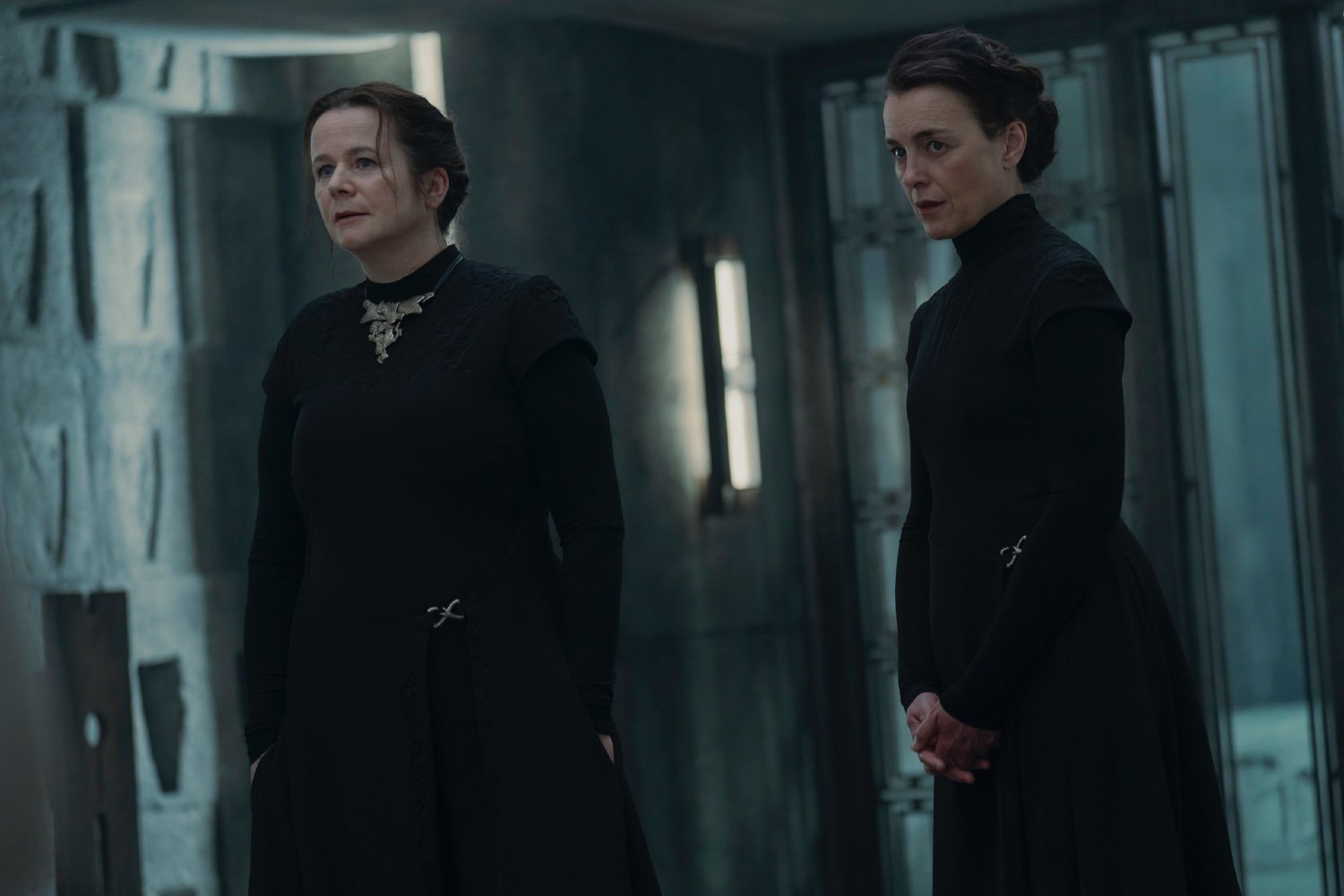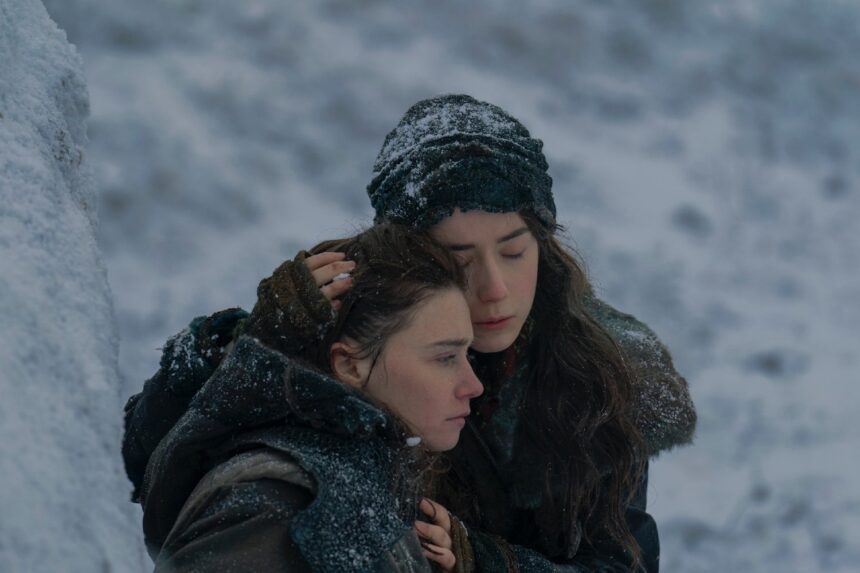If Dune: Prophecy hasn’t quite entered the cultural zeitgeist the way the Dune movies have—or the that other HBO show it resembles in some ways, Game of Thrones—it might be because it’s filled almost completely with characters that can be very hard to root for.
It’s a quality that’s necessary to propel the story. Though we know where things are headed 10,000 years down the line—the Bene Gesserit’s ingrained importance; House Harkonnen’s pale, creepy power; the downfall of Emperor Shaddam of House Corrino; the rise of Paul “Lisan al Gaib” Atreides—Prophecy drops us into tumultuous, uncertain times.
Most crucially, we know Prophecy’s Sisterhood will one day become the Bene Gesserit. But we don’t know how or when that will happen, or who will be the leader that takes them there. We also don’t know how they’ll overcome the greatest threat to their existence thus far, currently manifesting in a slippery man who seems to be fulfilling a doom-filled deathbed prophecy left behind 30 years earlier by Raquella, the Sisterhood’s founder.
This is a show that wants you to ride along even if you haven’t read any Dune books or watched Denis Villeneuve’s movies. So it makes the story a reasonably simple power struggle while giving us characters carefully painted in shades of grey, some skewing darker than others. Preexisting Dune fans will obviously pick up on more of the mythology, but signature elements are explained for newcomers. There’s a lot of sandworm talk, for instance, and Prophecy figures out ways to give us visuals to go with that despite not taking place on Arrakis.
As for those characters we’re starting to really love to hate: Valya Harkonnen, reigning Mother Superior of the Sisterhood, is Prophecy‘s ostensible protagonist—but her thirst for power has made her unlikable from the start. Her sister and fellow Sisterhood member Tula is far gentler on the surface, but she’s capable of being manipulated into committing horrific acts, as well as acting on her own worst impulses.
Meanwhile, Emperor Corrino—another familiar name—is so unsteady a leader that he’s allowed Desmond Hart, a soldier with violent, mystical gifts, to weaponize his grasp on the throne. The Emperor is a reasonable man, or he was once, but he’s starting to see the value in using terror as an enforcement tactic. Hart, meanwhile, has yet to have a scene that doesn’t make the audience gasp, whether he’s going toe-to-toe in mind games with Valya or using his strange abilities to cause enemies to burn up from the inside.
These are the opposing sides in Dune: Prophecy’s game of thrones—and the main players, who can’t trust most of the other people around them, are drawn together by their shared goals. This results in relationships that are as unhealthy as the means they use to achieve those goals. And there’s no bond more toxic than the one between Valya and Tula.

Thanks to a flashback episode (the perfectly titled “Sisterhood Above All,” the creed of the Sisterhood but also a theme for the actual siblings in the mix), we know that the Harkonnen sisters grew up on an icy wasteland distinguished by its whale-fur trade. The Harkonnens were dislodged from their Great House status thanks to a rumor—started by House Atreides, Valya says—of battlefield cowardice during the robot wars, which happened over 100 years before Prophecy’s main storyline.
This injustice, or perceived injustice, becomes young Valya’s obsession, and her fervor convinces Tula and Valya’s beloved brother, Griffin, to try and settle the score with the Atreides. He’s murdered for his efforts, and it changes the entire dynamic of the Harkonnen family. An even more rage-filled Valya, who has already begun to develop “the Voice,” is sent to study with the Sisterhood, so it’s up to Tula to avenge Griffin’s death. And while Tula loved her brother deeply, it’s understood that her decision to get engaged to an Atreides—then massacre dozens of his family members—was made thanks to Valya’s influence.
The trauma bonding continued when Tula followed Valya into the Sisterhood, and Valya used “the Voice” to murder her rival, Dorotea—a crime Tula subsequently helped conceal—en route to becoming the Sisterhood’s second Mother Superior.
Most recently on the show, Valya pressured Tula into convincing her favorite young acolyte, Lila, to undergo a dangerous ritual—basically, visiting the land of the dead to connect with her ancestor, Raquella—to learn more about that increasingly dire prophecy. Connect she does, but she also dies for her efforts… sort of, since Tula was able to bring her back to life using spice and forbidden technology, another secret that binds the Harkonnen sisters together.
The “you and me against the world” mentality that helped convince Tula to join Valya in the Sisterhood has now expanded to be more of “the Sisterhood against the world,” though it’s Valya out doing the political maneuvering while Tula stays behind at the Sisterhood’s training grounds. While Valya does her best to manipulate the Emperor and figure out Desmond’s weaknesses, Tula has her hands full with the Lila situation and an increasingly active rebellion among the acolytes.

It’s telling that Tula, the seemingly more gentle of the Harkonnen sisters, is also the more murder-y one. Yes, Valya coerced Dorotea into slashing her own throat, but Tula deliberately poisoned dozens of Atreides—and, just this week, had a vision of herself murdering an acolyte who’s come uncomfortably close to uncovering lies that the Harkonnens have been hiding amid an entire organization dedicated to telling the truth.
With Valya and Tula on different planets for most of Dune: Prophecy, there hasn’t been much time for tender moments, not that they would share any. About the closest the adult versions of the characters have come occurred in this week’s “Twice Born,” when Valya—running out of options in her battle with Desmond—started to send a message to Tula asking her for some sisterly back-up, then thought better of it.
But was that just another manipulation—more ammo as Valya plows toward her goal of reclaiming power for the Sisterhood in the Imperium—rather than a genuine need for familial affection? With just two episodes left to go, there’s no telling which Harkonnen sister will live, die, or betray… or worse, maybe even be the figurehead that elevates the Sisterhood into the Bene Gesserit. We’ll be eagerly watching to see how it plays out.
New episodes of Dune: Prophecy arrive Sundays on HBO and Max.
Want more io9 news? Check out when to expect the latest Marvel, Star Wars, and Star Trek releases, what’s next for the DC Universe on film and TV, and everything you need to know about the future of Doctor Who.
Read the full article here












